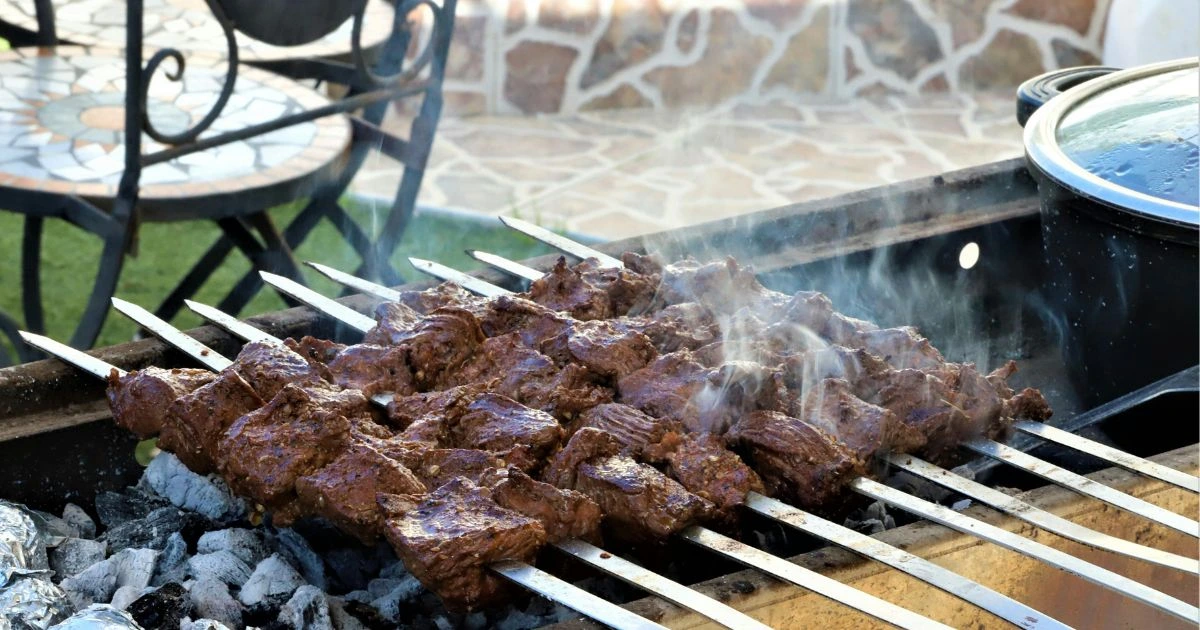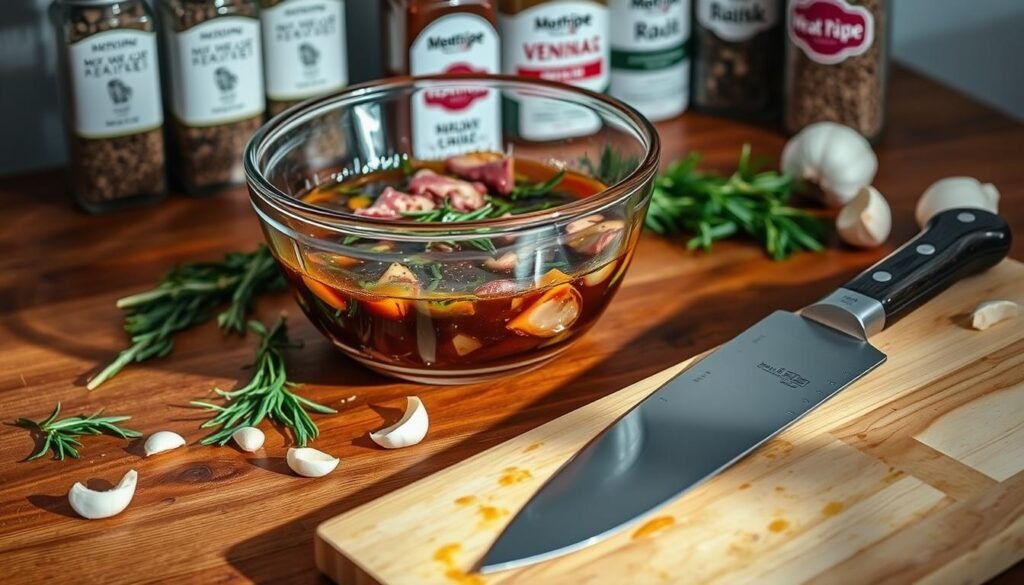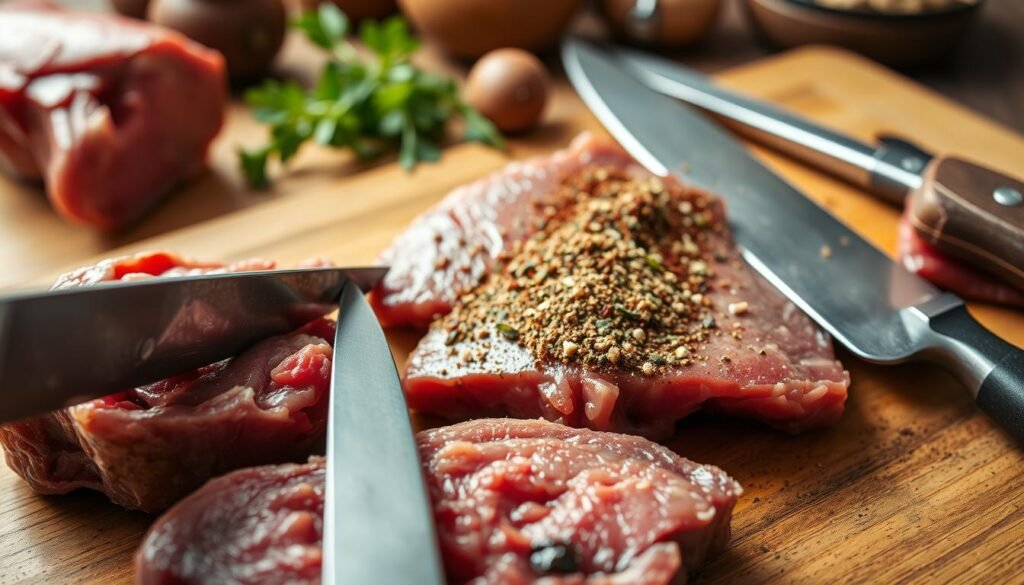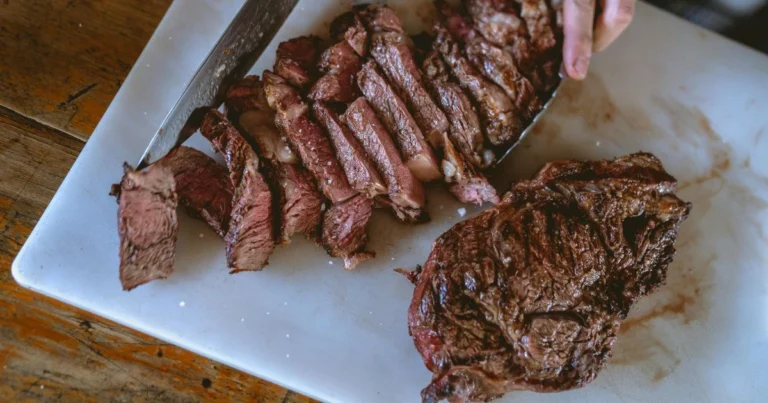The Best Venison Marinade for Tender, Mouthwatering Meat

As a passionate hunter and home cook, I’ve learned that making wild game delicious is more than just skill. It’s about understanding. Your venison marinade can turn tough, gamey meat into a tender, restaurant-quality dish. Your family will ask for seconds.
Making the perfect wild game marinade is an art. It turns lean, potentially tough deer meat into tender, flavorful meat. Whether you’re a seasoned hunter or a culinary enthusiast, mastering the venison marinade will make your game meat extraordinary.
The secret to great venison is knowing its unique characteristics. With only 6 grams of fat per 3-ounce serving, this lean meat needs special care. A well-designed deer meat seasoning can break down tough proteins and add rich, complex flavors that enhance the meat’s natural taste.
Table of Contents
Understanding Venison: From Field to Table
Venison is a special kind of meat that’s different from regular meat. It’s packed with nutrients and offers a unique taste. Learning about venison can make your cooking and eating more exciting.
Benefits of Wild Game Meat
Venison is very lean, with only 2-3 grams of fat per 100 grams. This makes it a healthier choice than beef. By using the right flavorings, you can bring out the best in venison.
- Lower in calories compared to beef
- Rich in essential nutrients
- High in protein content
- Excellent source of Vitamin B6 and B12
Why Venison Needs Special Treatment
Venison’s low fat makes it easy to overcook and taste gamey. Using a special sauce can help, cutting down the gamey taste by half. How you cook it affects its tenderness and flavor.
Nutritional Value of Deer Meat
| Nutrient | Venison Amount | Beef Comparison |
|---|---|---|
| Calories (per 100g) | 158 | 250-300 |
| Fat Content | 2-3g | 10-20g |
| Protein | High | Moderate |
| Omega-3 Fatty Acids | Higher | Lower |
Knowing these facts can help you make venison a true culinary delight. It can go from a tough ingredient to a dish that wows everyone.
Essential Components of a Perfect Venison Marinade
To make a great wild deer marinade, you need to know the key parts. These parts turn tough game meat into a tender, tasty dish. Your natural venison spice blend is key in making the meat taste better and feel softer.
The base of a top-notch marinade includes a few important ingredients:
- Acidic components: Lemon juice or red wine vinegar help break down meat proteins
- Oil base: Olive oil keeps the meat moist and spreads flavors evenly
- Flavor enhancers: Garlic, herbs, and spices add depth to the wild game
A good marinade usually has:
- ¼ cup olive oil
- 2 tablespoons red wine vinegar
- Juice of ½ lemon
- 3 minced garlic cloves
- 1 teaspoon Italian seasoning
- ¾ teaspoon salt
- ½ teaspoon black pepper
When making your natural venison spice blend, remember venison is leaner than beef. So, your marinade needs to work harder to tenderize and add moisture. The right mix of acidic and oil-based ingredients will make your wild game taste like it’s from a restaurant.
Pro tip: Aim to marinate your venison for 4-8 hours to achieve optimal tenderness and flavor absorption.
The Science Behind Tenderizing Game Meat
Learning about meat tenderization can change how you season venison. Venison is lean and muscular, so it needs special care for a tender and tasty dish.
Tenderizing venison involves complex chemical reactions. These reactions break down tough muscle proteins and improve meat quality. Your venison marinade can use several scientific methods to make meat tender.
Role of Acid in Protein Breakdown
Acidic ingredients are key in meat preparation. When making a venison marinade, remember these points:
- Acids break down muscle fibers
- Vinegar, citrus juices, and wine can get into the meat
- Acidic marinades only soften the outer ⅛-inch of meat
Impact of Oil-Based Ingredients
Oil-based parts in your herbed venison seasoning are very important:
- They keep meat moist during cooking
- Help spread herbs and spices evenly
- Protect meat fibers
Enzymatic Tenderizing Process
Natural enzymes can greatly improve meat texture. Soaking venison in milk for hours uses dairy’s enzymes to soften proteins and lessen gamey tastes.
Pro tip: Whole milk or buttermilk is best for tenderizing, with 4-12 hours for the best results.
By knowing these scientific facts, you can make a marinade that turns tough game meat into a tender, tasty meal.
Base Ingredients for the Ultimate Venison Marinade
Making the perfect venison steak marinade is all about the right ingredients. These ingredients turn wild game into a delicious meal. A good venison brine can make the meat taste better and be more tender.
The best venison marinade starts with the right base ingredients. Your marinade should mix flavors well and soften the meat.
- Olive oil: Provides moisture and helps distribute flavors
- Acidic components: Tenderize the meat
- Liquid flavor enhancers: Add depth to the taste profile
- Salt: Critical for seasoning and protein breakdown
For a great venison steak marinade, use this ingredient ratio:
| Ingredient | Quantity |
|---|---|
| Olive Oil | 3 tablespoons |
| Lemon Juice | 1 tablespoon |
| Worcestershire Sauce | 1 tablespoon |
| Soy Sauce | 1 tablespoon |
| Minced Garlic | 2 teaspoons |
| Ground Pepper | ½ teaspoon |
| Dry Red Wine | ¼ cup |
Pro tip: Marinate your venison steaks for at least 5 hours, turning every half hour to ensure even flavor distribution.
“The secret to a great venison marinade is balance and patience.” – Wild Game Chef
Every ingredient in your venison brine is important. Olive oil carries flavors, acids soften proteins, and seasonings add depth to your dish.
Herbs and Spices That Complement Wild Game
When cooking deer meat steaks, picking the right herbs and spices is key. It can turn your venison loin marinade into something special. Wild game needs a flavor mix that brings out its unique taste without covering it up.
Creating the perfect blend of herbs and spices is all about knowing how they work with venison. This meat loves certain flavors that make your dish stand out.
Fresh Herbs: A Flavor Revolution
Fresh herbs add a burst of flavor to your venison marinade. Here are some top picks:
- Rosemary – adds earthy, pine-like notes
- Thyme – provides subtle, woodsy undertones
- Sage – contributes a robust, slightly peppery taste
- Garlic – delivers deep, penetrating flavor
Optimal Spice Combinations
For your deer meat steaks marinade, try these spice mixes:
| Spice Category | Key Components | Flavor Profile |
|---|---|---|
| Classic Blend | Black pepper, sea salt, garlic powder | Robust and traditional |
| Smoky Blend | Smoked paprika, cumin, chili powder | Bold and intense |
| Herbal Blend | Dried thyme, rosemary, oregano | Aromatic and delicate |
For a great venison loin marinade, balance is everything. Start with a little and add more as you like. You want to enhance the wild game’s flavor, not hide it.
Marinating Times and Temperature Guidelines

Mastering the art of venison marinade is all about timing and temperature. Your grilled venison will be a hit if you follow these expert tips.
Marinating venison is key for tenderizing and boosting flavor. The marinating time depends on the cut and how intense you want the flavor:
- Steaks: 3-8 hours in the refrigerator
- Thick cuts: Up to 24 hours
- Thinner cuts: 1-3 hours
Temperature is vital in the marinade process. Always marinate in the fridge to keep meat safe and prevent bacterial growth.
| Meat Cut | Marinating Time | Refrigeration Temperature |
|---|---|---|
| Venison Steaks | 3-8 hours | 40°F |
| Venison Roasts | 6-12 hours | 40°F |
| Venison Chops | 2-4 hours | 40°F |
Here are some key tips for a great venison marinade:
- Turn meat every 30 minutes for even flavor
- Use an acidic component to tenderize
- Avoid marinating too long to prevent mushiness
Pro tip: Remove venison from the fridge 20-30 minutes before grilling. This ensures even cooking and tenderness.
Common Mistakes to Avoid When Marinating Venison
Preparing the perfect wild game marinade needs precision and care. Even small errors can greatly affect the dish’s quality and taste.
Knowing the common mistakes in venison preparation helps you make exceptional meals. These meals will highlight the meat’s unique flavor.
Risks of Over-Marinating
Over-marinating venison can make it mushy and unappetizing. Here are some key risks:
- Lean cuts absorb marinades quickly, becoming overly soft
- Protein structure breaks down excessively
- Meat loses its natural texture and integrity
Temperature Control Challenges
Proper temperature management is key when preparing your wild game marinade. Incorrect temperatures can lead to bacterial growth and food safety risks.
| Temperature Range | Risk Level | Recommended Action |
|---|---|---|
| 40-140°F | High Bacterial Growth | Avoid prolonged exposure |
| Below 40°F | Safe Marinating Zone | Refrigerate during process |
Ingredient Balance Problems
Creating the perfect deer meat seasoning is about balancing ingredients. Too much acid can break down proteins too quickly. Too many spices can overpower the venison’s flavor.
- Use acidic ingredients sparingly
- Select complementary herbs
- Maintain a balanced marinade ratio
By avoiding these common mistakes, you’ll improve your venison preparation. You’ll ensure tender, flavorful wild game every time.
Best Cuts of Venison for Marinating
Choosing the right venison cut is key for a tasty game meat flavoring. Different cuts react differently to marinades. Knowing their traits helps you get the most tender and flavorful results.
The backstrap (deer loin) is the top choice for marinating. It’s tender and great for quick cooking. It also soaks up marinades well. It’s about 1 lb, perfect for kebabs and steaks that need little prep.
- Haunch: Most tender cut, excellent for steaks
- Tenderloin: Lean and delicate, perfect for quick cooking
- Shoulder: Requires longer marinating and slow cooking
When picking your venison cut, think about the cooking method and how tender you want it. Tougher cuts like shoulder need longer marinating. This helps break down connective tissues and boosts flavor.
For the best results, marinate your venison overnight. This tenderizes the meat and adds rich, complex flavors. Use lime juice, Worcestershire sauce, and olive oil in your marinade to enhance the game meat’s taste.
Pro tip: Pan-searing quick-cooking cuts like loin helps maximize tenderness and lock in those delicious marinades.
Knowing each cut’s unique traits will make your venison cooking amazing.
Preparing Your Venison for the Marinade
Getting your venison ready for a delicious wild deer marinade requires careful preparation. Cleaning and trimming are key steps for the best flavor and texture. Knowing how to handle venison can make your cooking experience better.

Before applying your natural venison spice blend, follow some essential steps:
- Remove all visible silver skin and excess fat
- Pat the meat completely dry with paper towels
- Inspect the meat for any remaining connective tissues
- Trim away any discolored or damaged portions
Cleaning Techniques
Cleaning is crucial when preparing venison. Use sharp kitchen shears or a boning knife to trim unwanted membranes. Removing silver skin prevents tough, chewy meat and helps your marinade penetrate better.
Storage Best Practices
| Storage Method | Temperature | Maximum Duration |
|---|---|---|
| Refrigerator Storage | 32-40°F | 3-5 days |
| Freezer Storage | 0°F or below | 6-12 months |
Proper storage is key for maintaining venison quality. Always store in airtight containers or vacuum-sealed bags to prevent moisture loss and bacterial growth. For the best results, use fresh venison within a few days or freeze it immediately.
Pro tip: Always handle wild game meat with clean hands and tools to prevent cross-contamination.
By following these guidelines, you’ll prepare your venison for a mouthwatering wild deer marinade. This will bring out the best in your venison.
Cooking Techniques for Marinated Venison
Cooking marinated venison well needs skill and knowledge. Your marinade recipe is key to the meat’s taste and texture. Since venison is lean, you must choose cooking methods carefully to keep its flavor and tenderness.
Various cooking methods can greatly affect your venison’s taste. Here are the best ways to cook:
- Grilling: High heat (500°F) for 4 minutes per side gives a perfect medium-rare
- Pan-searing: Quick 2-3 minutes per side makes a tasty caramelized outside
- Slow-roasting: It brings out deeper flavors and makes the meat tender
- Smoking: Adds rich flavors to your marinated meat
Keeping the temperature right is important when cooking venison. It should be between 130°F (medium-rare) and 160°F (medium). Cooking it too long can make it tough and dry.
Pro tip: Let your marinated venison rest for 5-10 minutes after cooking. This allows the juices to distribute evenly, ensuring every bite is moist and flavorful.
Keep in mind that the secret to exceptional venison is honoring its distinct qualities and steering clear of overcooking.
Tips for Achieving Restaurant-Quality Results
To make your venison steak marinade stand out, pay close attention to every detail. Professional chefs say it’s not just about marinating the meat. It’s about the whole process.
Here are some tips to take your venison brine to the next level:
- Let the meat rest at room temperature for 30-45 minutes before cooking
- Pat the venison dry with paper towels to ensure perfect searing
- Use a cast-iron skillet for the most consistent heat distribution
- Allow meat to rest 5-7 minutes after cooking to redistribute juices
Experts say 90% of chefs believe resting meat makes it tender and flavorful. Your venison steak marinade will be amazing with these techniques.
Keeping the temperature right is key when cooking venison. Since it’s lean, cook it to rare or medium-rare (125°F internal temperature). Overcooking makes it tough and unappetizing.
“Passion transforms a good dish into an extraordinary culinary experience” – Professional Chef Wisdom
How you present the dish is important too. Slice against the grain, use clean plate edges, and garnish lightly. This will make your guests think you’re a pro.
Conclusion
Turning deer meat steaks from tough to tender takes dedication and skill. Your journey into venison preparation opens up a world of culinary possibilities. By understanding marinade techniques, selecting the right cuts, and applying precise cooking methods, you can elevate wild game from challenging to extraordinary.
Venison loin marinade techniques are crucial for unlocking the meat’s potential. The lean nature of venison demands thoughtful preparation. With proper marinating, you can enhance flavor, increase tenderness, and create restaurant-quality dishes that rival traditional beef offerings. Experimenting with different marinades and cooking approaches will help you develop your unique grilled venison style.
Your newfound knowledge empowers you to tackle even the most challenging cuts of game meat. Remember that marinating, slow cooking, and understanding meat composition are key to success. Whether you’re a hunting enthusiast or a curious home cook, mastering venison preparation will bring incredible dining experiences to your table.
Embrace the art of venison cooking with confidence. Each recipe you try will refine your skills, making you more adept at handling this lean, flavorful meat. Your culinary adventure with wild game is just beginning, promising delicious meals and exciting gastronomic discoveries.
FAQ
How long should I marinate venison?
Why does venison need special marinating techniques?
Can I use the same marinade for all cuts of venison?
What are the best ingredients for a venison marinade?
How can I prevent my venison from becoming too tough?
Is it safe to marinate venison at room temperature?
Can I freeze venison with marinade?
What’s the difference between marinating and brining venison?
Source Links
- https://butcherbbq.com/blogs/news/taming-the-wild-flavor-how-to-prepare-venison-like-a-pro – Taming the Wild Flavor: How to Prepare Venison Like a –
- https://www.meatsage.com/venison-steak-marinade/ – Easy Venison Steak Marinade for Juicy Deer Meat Steaks
- https://farmfieldtable.com/blogs/farm-field-table-a-butchers-perspective-blog/can-you-make-venison-taste-like-beef?srsltid=AfmBOoqPsaLsfXb3LPpWsU1iE555gI57zFQ4b5cUNI9TQOjLeh-dE1hb – Can you make venison taste like beef?
- https://www.southernliving.com/food/meat/the-5-things-you-should-know-about-cooking-venison?srsltid=AfmBOoquOVGWzRN1tyMFr3FhBcQt7DQor0Jr0bOacGTKEGJZKEbkj3GG – The 5 Things You Should Know About Cooking Venison
- https://www.missallieskitchen.com/all-purpose-venison-marinade/ – All-Purpose Venison Marinade – Miss Allie’s Kitchen
- https://jenndanella.com/grilled-venison-backstrap/ – The BEST Grilled Venison Backstrap – JennDanella.com
- https://www.therusticelk.com/marinated-venison-steak-recipe/ – Perfect Marinated Venison Steaks | How to Cook Deer Steak
- https://butcherbbq.com/blogs/news/taming-the-wild-flavor-how-to-prepare-venison-like-a-pro?srsltid=AfmBOoot4y9z8f-PWCjSfclY04vo4saJDbO_BfKz3hOGAiWaFxC8w1Wl – Taming the Wild Flavor: How to Prepare Venison Like a –
- https://www.wikihow.com/Tenderize-Meat-with-Beer – How to Tenderize Meat with Beer: 5 Steps (with Pictures) – wikiHow
- https://www.tastingtable.com/1663809/soak-steak-milk-bath-hack/ – Why You Should Be Soaking Your Steak In A Milk Bath – Tasting Table
- https://allourway.com/grilled-marinated-venison-steak/ – Grilled Marinated Venison Steak Tasty And Tender
- https://www.castironskilletcooking.com/venison-steak-marinade/ – The Best Venison Steak Marinade
- https://www.tasteofhome.com/recipes/venison-steaks/?srsltid=AfmBOopFDKFvA9bY8KYGawOwkz6l3zgKju31wGZr-DuSgdUbUstn7C8K – Venison Steaks
- https://magazine.outdoornebraska.gov/blogs/in-the-wild/wild-game-cooking/ – Wild Game Cooking 101 | Nebraskaland Magazine
- https://butcherbbq.com/blogs/news/elevate-your-game-with-butcher-bbqs-essential-seasoning-and-rubs?srsltid=AfmBOopXlbHT3DpnMDeaYR8MUScmomiTcF0mKR9Ey47vTod6Uv7xR4fl – Elevate Your Grilling with Butcher BBQ- Essential Seasoning and Rubs
- https://www.missallieskitchen.com/venison-steak/ – How to Cook a Juicy Venison Steak | Marinated Deer Steak
- https://pauliesaucerecipes.com/post/grilled-venison-rack/ – Grilled Venison Rack: Elevate Your Wild Game – Recipe Food Blogger | Paulie Sauce Recipes
- https://www.tasteofhome.com/recipes/venison-steaks/?srsltid=AfmBOoqIQfG37HHh0K1Q8jkrtAizQxFfjrpltltPcvBfLyNPsfSw-O8Q – Venison Steaks
- https://www.tastingtable.com/1790673/andrew-zimmern-never-marinate-venison-steak/ – The Game Meat Andrew Zimmern Doesn’t Want You To Marinate – Tasting Table
- https://www.southernliving.com/food/meat/the-5-things-you-should-know-about-cooking-venison?srsltid=AfmBOoql1aAqwVGG0mq5g0XibcXGXs8GsjyA__c97ihIa3YI8CVbeoCX – The 5 Things You Should Know About Cooking Venison
- https://www.scotlands-enchanting-kingdom.com/cook-roast-venison/ – Cook Roast Venison – Essential Tips For A Delicious And Tender Roast
- https://www.binkysculinarycarnival.com/venison-steak-kabobs-grilled-to-perfection/ – Venison Steak Kebabs- Grilled to Perfection
- https://goodiesfoodhall.co.uk/the-ultimate-guide-to-cooking-venison-tender-flavourful-and-perfect-for-winter/ – The Ultimate Guide to Cooking Venison: Tender, Flavourful, and Perfect for Winter
- https://www.deeranddeerhunting.com/content/articles/4-best-venison-marinades – 4 Best Venison Marinades
- https://butcherbbq.com/blogs/news/taming-the-wild-flavor-how-to-prepare-venison-like-a-pro?srsltid=AfmBOoqBC5SAiXPLa0i5JYzL-mF-pFnfb37E0Bv6dkywaiyHprP7k-G3 – Taming the Wild Flavor: How to Prepare Venison Like a –
- https://crockettcreek.com/step-up-your-game-venison-cooking-guide-venison-recipes/ – Step Up Your Game: Venison Cooking Guide & Venison Recipes – Crockett Creek Jerky
- https://www.bowhunter.com/editorial/juniper-balsamic-and-wine-venison-steaks-recipe/309181 – Juniper, Balsamic and Wine Venison Steaks Recipe – Bowhunter
- https://butcherbbq.com/blogs/news/taming-the-wild-flavor-how-to-prepare-venison-like-a-pro?srsltid=AfmBOoqh_JfFYuCXaLJDRBUxKs0JfWxfQiKUJuGmzkdvlsZ9q9MOsoM7 – Taming the Wild Flavor: How to Prepare Venison Like a –
- https://www.southernliving.com/food/meat/the-5-things-you-should-know-about-cooking-venison?srsltid=AfmBOorHN8XJqDAEYA_Wq-u1Djh5fNyVpFmP953T5p7pvKh6Ru1VQKsd – The 5 Things You Should Know About Cooking Venison
- https://www.garyrhodes.com/essential-cooking-tips-and-tricks/ – Cooking Mastery: Essential Cooking Tips and Tricks
- https://butcherbbq.com/blogs/news/mastering-the-art-of-cooking-prime-rib-tips-from-a-world-bbq-champion?srsltid=AfmBOorMSxoeAHqsUIqefIc0gxRv8Rg89VWruxhwjLE0XN0hPpmsFod- – Easy To Follow Tips For Cooking a Prime Rib – Butcher BBQ
- https://butcherbbq.com/blogs/news/unlock-the-flavor-mastering-the-art-of-smoking-deer-meat?srsltid=AfmBOooKoTAjlviJdJKl4r_fvqkP33qlJepAnW1Cfz72tb9ezhJHwjVd – Unlock the Venison Flavor: Mastering the Art of Smoking Deer Meat –
- https://farmfieldtable.com/blogs/farm-field-table-a-butchers-perspective-blog/can-you-make-venison-taste-like-beef?srsltid=AfmBOooMVcClVEPN0Tb3MfkURZxby-YKJeXAl1Vwzuvr9iBxFQORaYnb – Can you make venison taste like beef?






